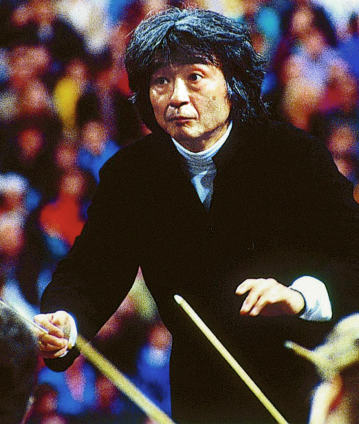Seiji Ozawa conducts a “Russian Night” at the Waldbühne

Few other countries have enriched the world of classical music with such dynamic compositions as Russia, a point well illustrated by a concert held in the Berlin Waldbühne, when Tchaikovsky’s delicately whirling Nutcracker was coupled with Stravinsky’s tremendous Firebird and the archaic weight of Borodin’s Polovtsian Dances. The conductor of this Russian Night was Seiji Ozawa, whose energy and élan likewise seemed to know no bounds.
What is now a permanent institution in the musical life of Berlin began as an experiment in 1984, when the Berliner Philharmoniker launched the Berlin Midsummer Night’s Dream Festival of Culture by giving a concert in the Waldbühne for the first time in their history. In spite of the pouring rain some 20,000 music lovers turned up for the event at the edge of the Grunewald and heard a varied programme of works conducted by Reinhard Peters that ended in the best al fresco manner with a magnificent display of fireworks. Cannons and gunpowder smoke had earlier accompanied the performance of Tchaikovsky’s 1812 Overture, the same work that was played at the orchestra’s tenth summer concert, when Seiji Ozawa invited music lovers back to the Waldbühne for a Russian Night.
Tchaikovsky’s The Nutcracker was first staged at the Mariinsky Theatre in St Petersburg in 1882 and continues to be performed by ballet companies all over the world, especially at Christmas. Stravinsky’s The Firebird – the first of his three “Russian” ballets – first saw the light of day barely thirty years later in Paris in a production by Sergei Diaghilev’s famous Ballets Russes. Both composers prepared suites for the concert hall from their respective scores, but open-air performances can be every bit as effective.
The evening began with Rimsky-Korsakov’s Russian Easter Festival Overture, which celebrates Christ’s Resurrection with magnificent sounds. No less powerful are the Polovtsian Dances from Borodin’s opera Prince Igor, where they mark the climax of celebrations at the court of the Polovtsian Khan Konchak staged to impress the khan’s prisoner, Prince Igor. In the Waldbühne two final items on the programme provided a lively ending to this musical midsummer night’s dream: the Radetzky March by Johann Strauss and – another permanent institution – Paul Lincke’s Berliner Luft.
© 1993 EuroArts Music International
Category
Artists
Our recommendations
- Seiji Ozawa conducts a Gershwin Night at the Waldbühne
- Simon Rattle’s first Waldbühne concert
- Simon Rattle conducts Rhapsodies at the Waldbühne
- Tugan Sokhiev conducts Prokofiev and Ravel at the Waldbühne
- Simon Rattle and Magdalena Kožená at the Waldbühne
- Simon Rattle conducts Beethoven and Mendelssohn at the Waldbühne